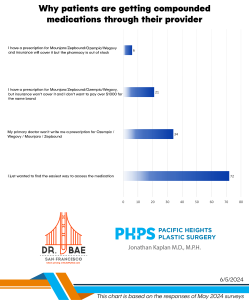 Here in San Francisco, the city and health department issued a directive on May 15th allowing elective surgery. In the directive, it was very clear elective surgery, including cosmetic surgery and dental procedures, could move forward. For this reason, we began performing cosmetic surgery in our in-office AAAASF accredited operating room the following Monday, May 18th.
Here in San Francisco, the city and health department issued a directive on May 15th allowing elective surgery. In the directive, it was very clear elective surgery, including cosmetic surgery and dental procedures, could move forward. For this reason, we began performing cosmetic surgery in our in-office AAAASF accredited operating room the following Monday, May 18th.
A full two months had passed after the last case in our office. Since the 18th, we’ve been busy going through our back log of cases. Based on previously scheduled cases and newly booked procedures, we’ll be operating at full capacity for the foreseeable future. While we have the luxury of performing cosmetic surgery in our own facility, not all facilities are proceeding with cosmetic surgery. Why not?
Facilities allowing elective cases but not performing cosmetic surgery
Based on a recent conference call with the leadership of one of the local hospitals, they explained they were deferring cosmetic surgery at their facilities for up to 6 months. The reason given was the need to clear their backlog of higher tier cases. They of course were referring to this table developed by the Centers for Medicare and Medicaid. According to the table, cosmetic surgery is considered tier 1 and administrators should consider postponing.
However, there may be another underlying, unspoken reason facilities that generally handle insurance-based elective surgery are deferring cosmetic surgery for now.
Financial factors driving decision to defer performing cosmetic surgery?
According to a report from the American Hospital Association in this Becker’s Healthcare Review article, hospitals are estimated to lose $200 billion between March 1st and June 30th. Of this, $161 billion is due to expected revenue losses from canceled services, including nonelective and elective surgery, and outpatient treatment.
But it’s worth noting that in the same article, Becker’s lists the top ten specialties that generate the most revenue for a hospital through elective and non-elective procedures. Here’s the list based on the Merritt Hawkins 2019 Physician Inpatient/Outpatient Revenue Survey:
1. Cardiovascular surgery
Average revenue: $3.7 million
2. Cardiology (invasive)
Average revenue: $3.48 million
3. Neurosurgery
Average revenue: $3.44 million
4. Orthopedic surgery
Average revenue: $3.29 million
5. Gastroenterology
Average revenue: $2.97 million
6. Hematology/Oncology
Average revenue: $2.86 million
7. General surgery
Average revenue: $2.71 million
8. Internal medicine
Average revenue: $2.68 million
9. Pulmonology
Average revenue: $2.36 million
10. Cardiology (noninvasive)
Average revenue: $2.31 million
Notice which specialty is missing? Cosmetic plastic surgery is not a major driver of revenue for a hospital or hospital outpatient department (HOPD) such as hospital-owned surgery centers. Sure cosmetic plastic surgery conjures images of expensive out-of-pocket, non-insurance based breast augmentations, tummy tucks and mommy makeovers. But to a hospital, the facility fee paid by a cosmetic patient pales in comparison to the more lucrative facility fees paid by insurance companies for medically necessary hand surgery, hip or knee joint surgery, or minimally invasive cardiac procedures.
This is arguably the real reason hospitals across the US will prioritize greater revenue-producing insurance-based procedures over cosmetic procedures. And while that’s certainly the hospital’s prerogative to make that financial decision, admitting it may avoid further uncomfortable and futile conference calls, like the one I was recently privy to.
Moving forward, surgeons, be they cosmetic plastic surgeons or other specialties where it’s feasible, should consider building their own accredited office-based operating room. Aside from better outcomes, a better experience for patient and doctor, it’s also nice being in charge of your destiny, professionally.
Click here for the original blog post written by Dr. Kaplan for BuildMyBod.
Dr. JonathanKaplan is a board-certified plastic surgeon based in San Francisco, CA andfounder/CEO of BuildMyBod Health, a price transparency-leadgeneration platform. You can watch him operate and educate @realdrbae onInstagram, Snapchat and TikTok.




